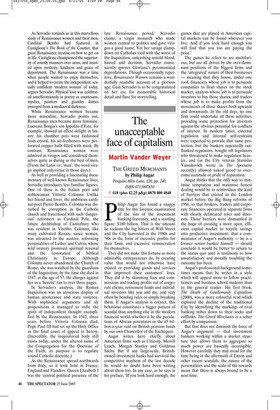The unacceptable face of capitalism
Martin Vander Weyer
THE GREED MERCHANTS by Philip Augar Penguin/Allen Lane, £20, pp. 240,
ISBN 0713997850
✆ £18 (plus £2.25 p&p) 0870 800 4848 Philip Augar has found a snappy title for this forensic examination of the sins of the investment banking fraternity, and a startling figure: $180 billion. That is the amount he reckons the big hitters of Wall Street and the City harvested in the 1980s and ’90s in the form of excessive profits for their firms and excessive remuneration for themselves.
They did not make this fortune as more admirable entrepreneurs do, by creating value that would not otherwise have existed or providing goods and services that improved their customers’ lives. They did it by skimming fees and commissions and trading profits out of corporate clients, retirement funds and individual investors like you and me, and very often by bending rules or simply breaking them. If Augar’s analysis is correct, this behaviour constitutes a bigger pattern of scandal than anything else in the modern financial world, whether it be the peculations of African potentates or the £5 billion-a-year raid on British pension funds by our own Chancellor of the Exchequer.
Augar writes here chiefly about American firms such as Citicorp, Merrill Lynch, Morgan Stanley and Goldman Sachs. But if any large-scale, Britishowned investment banks had survived the competitive mayhem of the last decade he would no doubt have been writing about them too. In any case, as he says in his preface, ‘If you look hard enough, the games that are played in American capital markets can be found wherever you live. And if you look hard enough you will find that you too are paying the price.’ The games he refers to are multifarious, but are all driven by the over-dominant positions of the biggest firms and the ‘integrated’ nature of their businesses — meaning that they house, under one roof, financiers whose job is to persuade companies to float shares on the stock market, analysts whose job is to persuade investors to buy those shares, and traders whose job is to make profits from the movements of those shares both upwards and downwards. In the old days, no one firm could undertake all these activities, providing some protection for investors against the obvious potential for conflicts of interest. In modern times, external regulation and internal self-restraint were expected to provide that same protection, but the bankers repeatedly outflanked regulators, bought off legislators who threatened to make regulation heavier, and (as the City veteran Stanislas Yassukovich wrote in The Spectator recently) allowed naked greed to overcome rectitude or pride of reputation.
Augar thinks that the only way to minimise temptation and maximise honest dealing would be to reintroduce the kind of barriers that existed in the London market before the Big Bang reforms of 1986, so that brokers, traders and corporate financiers operated in separate firms with clearly delineated roles and interests. Those barriers were dismantled in the hope of creating a more open, efficient capital market to recycle savings into productive investment: that a commentator of Augar’s authority — he is a former senior banker himself — should conclude it would be better to return to the status quo ante is testimony to how unsatisfactory and morally troubling the outcome has been.
Augar’s professional background sometimes means that he writes in a style which will appeal more to fellow practitioners and business school students than to the general reader. His first book, The Death of Gentlemanly Capitalism (2000), was a more colourful read which explored the decline of the traditional City by identifying the markings of rival banking tribes down to their socks and cufflinks. The Greed Merchants is a sober effort by comparison.
But that does not diminish the force of Augar’s argument — that investment bankers working within a market structure that allows them to aggregate so much power are basically incorrigible. However carefully they may tread for the time being in the aftermath of Enron and other recent scandals, the nature of the personalities and the scale of the rewards mean that there is always bound to be a next time.


































































 Previous page
Previous page